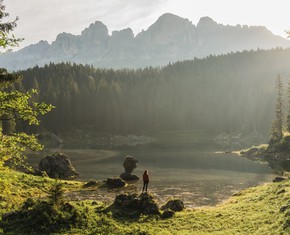The views expressed in our content reflect individual perspectives and do not represent the authoritative views of the Baha'i Faith.
Is knowledge greater than love? We human beings often fall in love without really knowing another person, so does knowledge come after love?
It certainly does if you consider the sequential order of Baha’u’llah’s mystical treatise The Seven Valleys.
That profound book places The Valley of Knowledge after the Valley of Love. So, since the series of valleys – which symbolize the stages of spiritual development – represent progressive spiritual growth, then we might consider the Valley of Knowledge more advanced than the preceding valley.
In his “Valley of Knowledge,” Baha’u’llah recounted the celebrated ancient story of Majnun and Layli. Symbolizing true human love bordering on the divine, the story has thematically driven many romantic poems for millennia.
The way I see it, Baha’u’llah’s narrative of Majnun and Layli illustrates the notion that knowledge supersedes love:
There was once a lover, it is said, who had sighed for long years in separation from his beloved, and wasted in the fire of remoteness. From the rule of love, his breast was void of patience and his body weary of his spirit; he reckoned life without her as a mockery, and the world consumed him away. How many a day he found no respite from his longing; how many a night the pain of her kept him from sleep. His body was worn to a sigh, and his heart’s wound had turned him to a cry of sorrow. A thousand lives would he freely have given for one taste of the cup of her presence, and yet even this was not within his reach. The doctors knew no cure for him, and companions avoided his company; yea, physicians have no remedy for one sick of love, unless the favour of the beloved deliver him.
At last the tree of his longing yielded the fruit of despair, and the fire of his hope fell to ashes. Then one night he could bear life no more, and he left his house for the marketplace. On a sudden, a watchman followed after him. He broke into a run, with the watchman in swift pursuit; then other watchmen came together and barred every passage to the weary one. And that wretched one cried from his heart, and ran here and there, and moaned to himself, “Surely this watchman is ‘Izrá’íl, my angel of death, following so fast upon me, or he is a tyrant of men, prompted by hatred and malice.” His feet carried him on—that hapless one bleeding with the arrow of love—while his heart lamented. Then he came to a garden wall, and with untold pain and trouble he scaled it. He saw that it was very high; yet, forgetting his life, he threw himself down into the garden.
And there he beheld his beloved with a lamp in her hand, searching for a ring she had lost. When the heart-surrendered lover looked upon his ravishing love, he drew a great breath and lifted his hands in prayer, crying, “O God! Bestow honour upon the watchman, and riches and long life. For the watchman was Gabriel, guiding this poor one; or he was Isráfíl, bringing life to this wretched one! … Now if the lover could have seen the end, he would from the beginning have blessed the watchman, prayed God on his behalf, and seen his tyranny as justice; but since the end was veiled to him, he lamented and made his plaint in the beginning. Yet those who journey in the garden land of true knowledge, since they see the end in the beginning, behold peace in war and conciliation in enmity. – Baha’u’llah, The Seven Valleys, in The Call of the Divine Beloved, pp. 23-24.
Contextualizing this story in my personal life, I recognize that even if I have strong feelings towards a significant other, and it’s not working out, that I have to get over this feeling of being crushed and rejected. All of us need to understand that the future is veiled – none of us knows what these harsh present conditions will lead to.
However, Baha’u’llah’s telling of Majnun and Layli’s story can reassure us that God plans and divinely confirms a desirable end for each of us – but also that we have to trust that He does have our best interests at heart, even while we’re struggling. From an even higher perspective, The Seven Valleys suggests, we should view this whole thing we call life as one seamless continuous plan – as a monolith not segregated into “first,” “middle,” or “last.”
In other words, instead of feeling down and sorrowful like Majnun did at first, try to see the end in the beginning – or at least understand the future as divinely confirmed by the Creator, and trust in Him in the present. As Rumi so beautifully and eloquently put it:
Whatever happens to you, don’t fall in despair. Even if all the doors are closed, a secret path will be there for you that no one knows. You can’t see it yet … But so many paradises are at the end of this path. Be grateful! It is easy to thank after obtaining what you want …Thank before having what you want.
In exactly the same way, Baha’u’llah asks everyone to have faith in the future and “abide in safety within the court of Holiness:”
Thou wouldst apprehend the most obscure signs and the most abstruse allusions, and wouldst clearly behold the mysteries of the beginning in the point of the end. All matters would be made easy unto thee, fire would be turned into light, knowledge and blessings, and thou wouldst abide in safety within the court of holiness. – Baha’u’llah, Gems of Divine Mysteries, p. 15.
















Comments
Sign in or create an account
Continue with Googleor